The Awakening
The Awakening is a novel by Kate Chopin published in 1899.
It tells the story of unorthodox views on women’s roles, femininity, active sex life and motherhood in a period when social attitudes did not tolerate such views from women.
The novel is an earlier work of feminism as it shows a woman’s search for identity by rejecting oppressive social norms.
The Awakening is a social commentary novel that psychologically explores femininity issues.
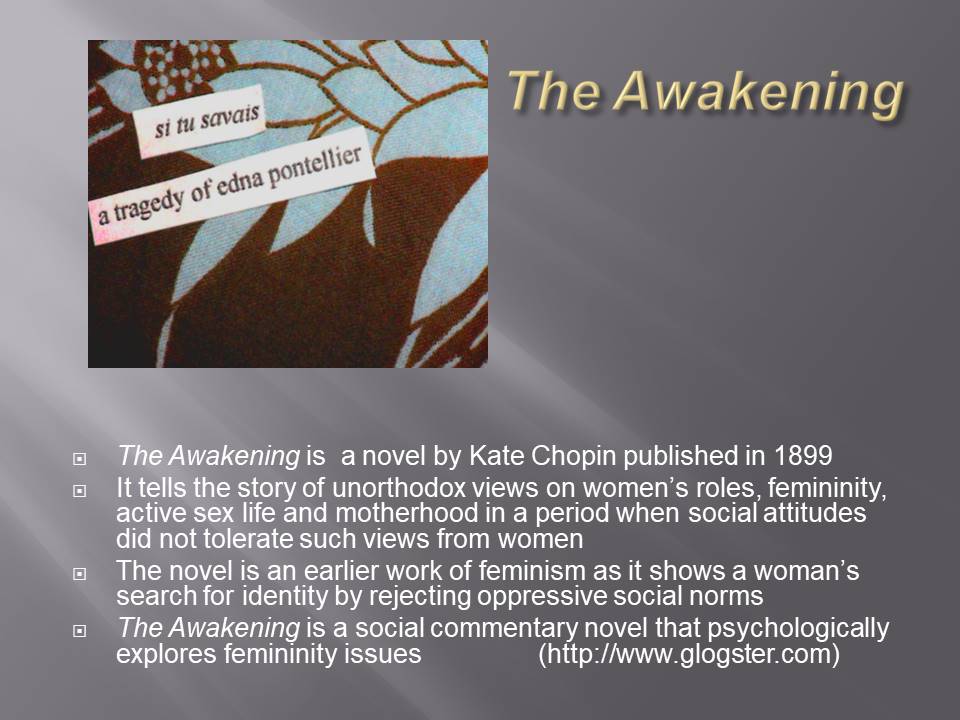
Sleep (the motif)
Sleep acts as a powerful motif in the book.
Readers can identify major patterns of sleep and wakefulness throughout the story.
For Edna to realize her position , she must sleep and wake up.
She must recognize herself and position in the world as a human being and as an individual in the society.
Therefore, to be awake implies:
- To know.
- To be enlightened.
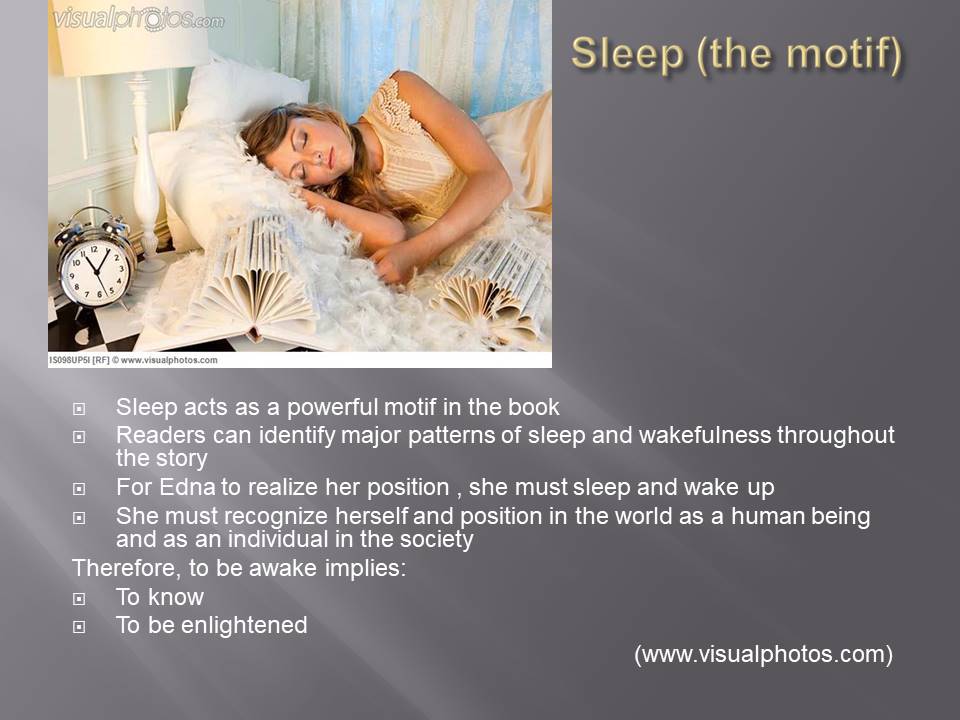
Sleep (think deeply)
Edna celebrates the “Mass” after she wakes up from her sleep in Chapter XIII.
Edna has literally woken up from her nap and learns about the clear details about her world after her sleep and wonders just how long she has slept.
Sleep allows Edna to thinking deeply, which is necessary for her.
She realizes her fundamental isolation from this old world and her need to enter a new one after tossing in the sofa until morning (Chopin 886).
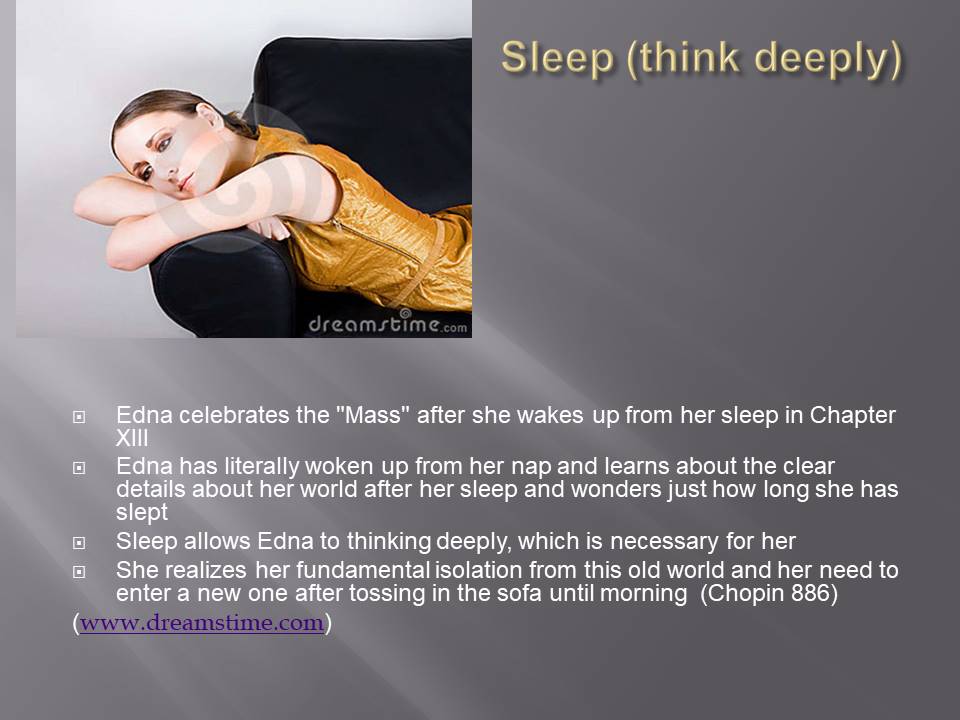
Sleep (Ignorance)
Chopin associates sleep with Edna’s ignorance.
On the other hand, Edna’s wakefulness represents new knowledge of self-identity.
Edna spends time between napping and waking up, which fit the book’s title, The Awakening.
It indicates a discovery of new knowledge.
Therefore, Edna strives to avoid sleep by staying awake in the sofa.
Edna’s waking up shows us that change is about to take place.
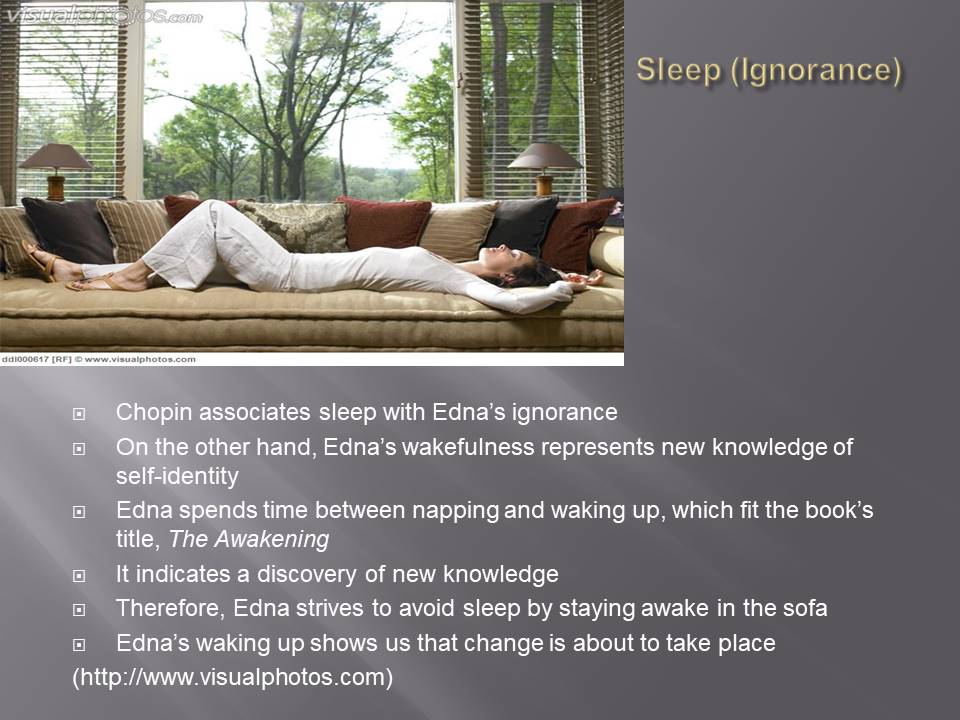
Sleep (independence and identity)
When Edna wakes up, she realizes that she is possessed by Mr. Pontellier as an object.
Edna wakes up to this reality of a woman being a man’s possession, which leads to oppression.
In Chapter 36, when Chopin writes “no longer one of Mr. Pontellier’s possessions to dispose of or not…”, she is making a clear declaration that her status in life has changed.
Edna is asserting her independence as a woman from a possessive husband.
Edna is rejecting the repressive social structure that has kept her confined and oppressed and seeks for isolation in the pigeon’s house where she could sleep.
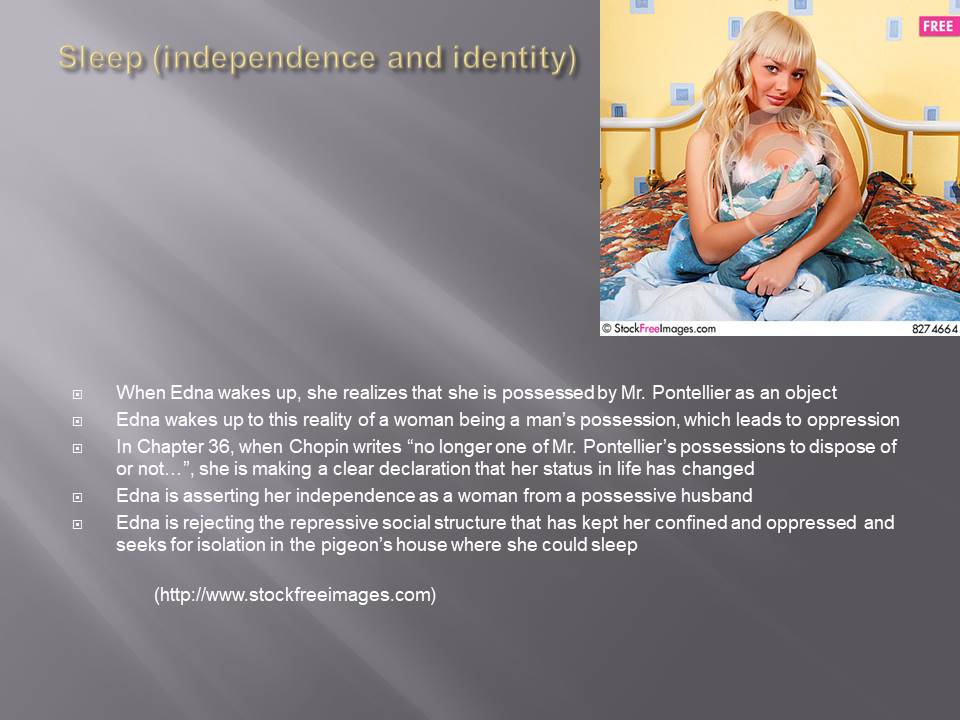
Sleep (wakefulness and self-discovery)
Chopin notes that perhaps it is important to wake up after all, even to suffer rather than to remain a dupe to illusions all one’s life.
This statement reflects Edna’s sleep and wakefulness.
Edna’s sleep, in this case, represents repressed life of the past century that women had to endure.
Edna was duped to the illusions of “propriety” held by men and society in her time.
Waking up is a motif for attaining her true self and desires.
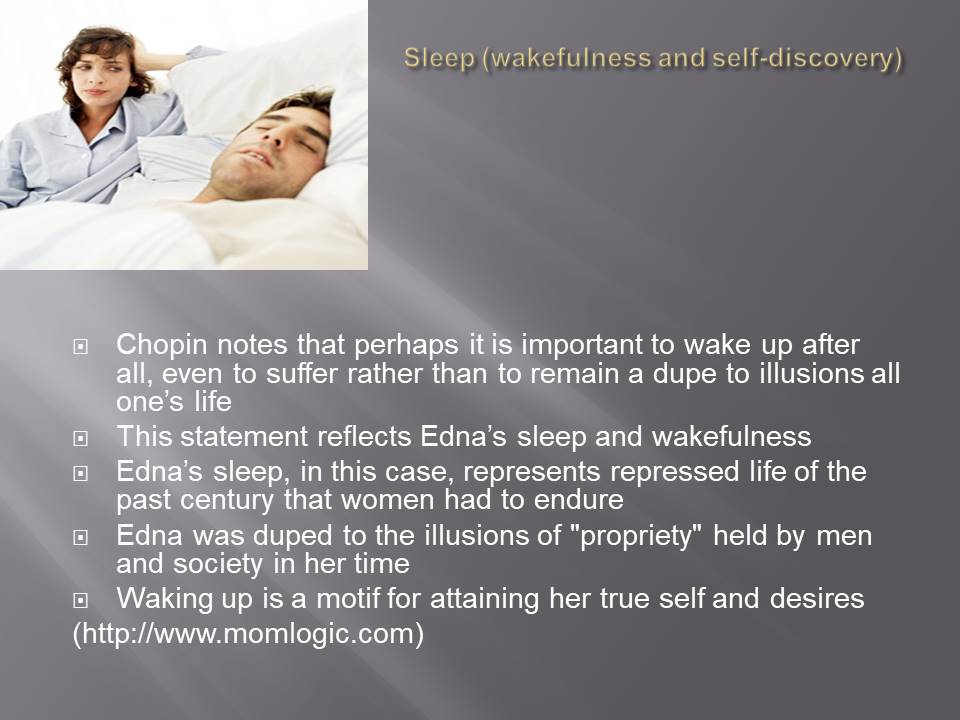
Sleep (Isolation)
Through sleep, Edna isolates herself from others and society.
Edna discovers who she truly is because sleep is a form of escapism from oppressive norms of society.
Chopin asserts the view that people possess “true selves“, which is distinct from the true selves of other people in society.
Edna only comes to the “awakening” that isolation by sleeping is mandatory for the discovery of her true self through different forms of reactions to relationships with others in an oppressive society, particularly Robert Lebrun.
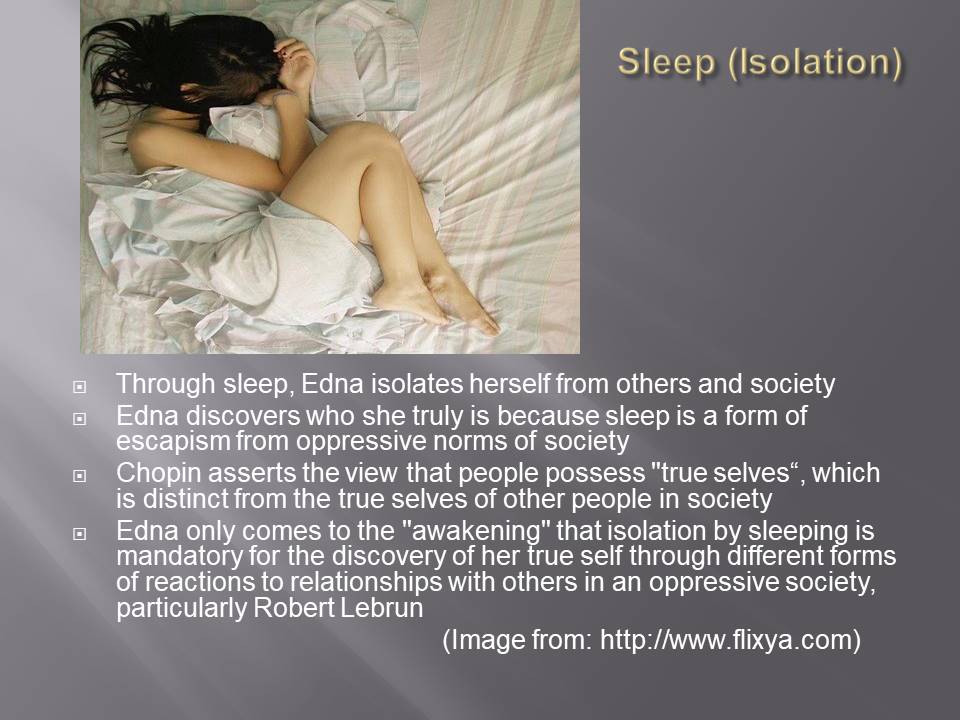
Sleep (freedom)
As a property, Leonce values and greatly admires his “purchase” of Edna.
However, Edna has come to regard herself as a possession for which her husband had bought and paid.
As a Presbyterian husband, Leonce observes strict guidelines, which create the oppressive and dehumanizing environment in which Edna’s marriage has existed and must endure.
Such an environment makes Edna to seek for isolation and freedom by sleeping.

Sleep (escapism)
In the end, Edna shall sleep in the sea, but the sleep of death occasioned by her suicide (Levine 72).
However, in death, Edna will be awake and free from the oppressive world to women.
Edna must escape social forces and discover her true self, but this must come through death.
They are the social forces from which Edna must escape in order to discover who she really is . . . in order to become fully “awakened.”
It may be considered one irony of the novel that Edna only comes to the “awakening” through death and that complete isolation is necessary for the birth of her true self by a series of reactions to relationships with others, which culminate in suicide.
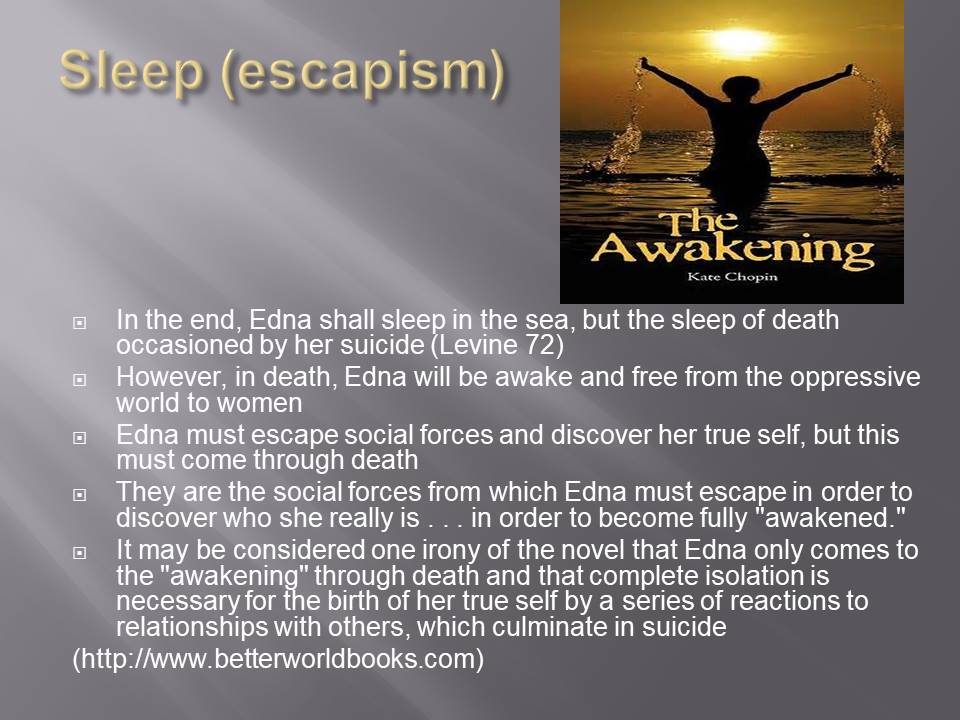
Sleep (tragic)
In The Awakening, Edna as a woman struggling for self-identity loses to men and oppressive society.
Edna has been subjugating her true self to her husband and society her whole life.
She realizes in Chapter XXXIX and embarks on a last journey into the ocean.
Only when Edna rejects the oppressed self does she “awaken” to her true self.
Women would continue to struggle for equality for the better part of another century.
It is within this historical context that one should look at the motif of sleep in the novel.
Levine notes, “A close study of this rhythmic pattern demonstrates the logical though tragic connection between Edna’s sleep habits and her suicide….” (p. 2).
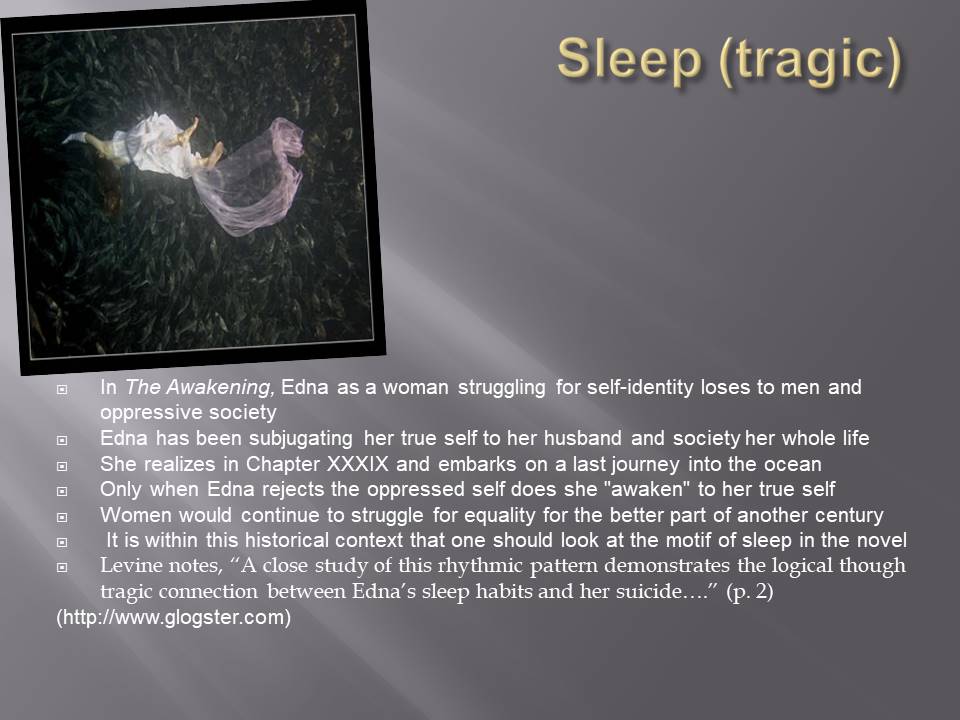
Works Cited
Chopin, Kate. The Awakening. New York, NY: Bantam Classic, 1981. Printed.
Levine, Robert S. “Circadian Rhythms and Rebellion in Kate Chopin’s “The Awakening”.” Studies in American Fiction 10.1 (1982): 71. ProQuest. Web.